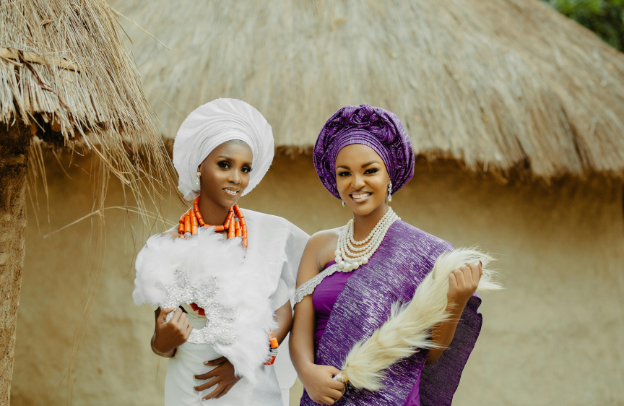Return to Roots: The Power of Traditions in African Diaspora Tourism

How often have you heard someone say, “I’m going back home for a celebration,” or “I’m returning to my roots”? These aren’t just casual expressions; they reflect a deep, often unspoken connection to a place that might no longer be home in the traditional sense, but holds something equally profound: identity, culture, and history. What drives this powerful urge to return? What is the role of cultural heritage in bringing people back to their ancestral lands? And why, as travel entrepreneurs, should you care about this emerging trend in diaspora travel?
Learn with AClasses Academy and improve yourself and your business skills
Welcome to the world of diaspora travel, where traditions, nostalgia, and a strong sense of cultural identity create a growing market that is reshaping the way we understand travel today.
In Lenia Marques’ article “The Power of Traditions and Their Relationship to Diaspora Tourism: The Journey to Return Home,” it is discussed that cultural manifestations have long served as powerful connections between people, offering a sense of identity to social groups throughout history.
The article highlights how, through migration, the celebration of festivals and iconic events from one’s place of origin can become a compelling motivator for return. Think of the hundreds of millions of African diasporas, scattered across all continents of the world and you will understand why these cultural traditions allow them, even if only momentarily, with their roots and homeland.
Diaspora travel is not just about visiting exotic destinations or discovering new places; it’s about going back to one’s roots, rediscovering family histories, and participating in rituals that carry profound meaning.
See also The Power of Group Cultural Tourism to Build Deeper Connections Among People of the African Diaspora
For the African diaspora, this connection to heritage is increasingly becoming an essential part of their travels. As an entrepreneur looking to tap into this dynamic market, understanding the power of traditions in diaspora travel can help you shape unique, impactful travel experiences that not only attract the right audience but foster meaningful cultural exchanges.
In this article, we will explore how diaspora travel is becoming a powerful tool for reconnecting with cultural roots, why traditions hold such sway over these travel decisions, and how entrepreneurs can design travel experiences that resonate deeply with this audience.
Along the way, we will dive into the remarkable insights of Obehi Ewanfoh, a leading diaspora storyteller and cultural advocate, whose work exemplifies the transformative role of tradition and identity in the African diaspora’s travel journey.
The Heart of Diaspora Tourism: Traditions That Bind
When you think about cultural travel, what comes to mind? Is it the stunning landscapes of Africa’s savannas or the bustling markets of Accra? While these visual and sensory experiences are undoubtedly a part of the diaspora tourist’s journey, the true heart of diaspora travel lies in the traditions, cultural practices, and rituals that bind people to their past, their families, and their communities.
For the African diaspora, these traditions are a thread woven into the fabric of their identity, connecting them to places, memories, and experiences that span across continents and generations.
In the article, Diaspora Tourism by StudySmarter, a UK-based educational platform, diaspora travel is described as the travel undertaken by individuals to their ancestral homelands.
This type of travel is driven by a desire to reconnect with one’s heritage, culture, and origins. It’s about coming home to rituals that have been passed down through centuries, whether it’s the annual celebration of the African New Year in Ghana or the colorful, music-filled festivals in Nigeria.
These cultural festivals are not simply events, they are lifelines that maintain the connection between the diaspora and their homeland. And they serve as powerful motivators for travel.
One vivid example is the Homowo Festival in Ghana, a celebration rooted in the ancient traditions of the Ga people. During this festival, diaspora Ghanaians travel from far and wide to join their relatives in celebrating the harvest and honoring ancestral spirits.
Experience goes beyond the festivities, it’s an emotional reunion with culture, history, and family. The same can be said for the Eyo Festival in Lagos, Nigeria, where diaspora Nigerians (mostly of Yoruba group) return to witness a vibrant display of traditional royal dances and processions, celebrating the history of their people.
But why do these traditions hold such power? It’s because, for many in the African diaspora, their cultural practices are more than just memories—they are part of their personal identity.
As Obehi Ewanfoh, a Nigerian writer and storyteller in Verona Italy, eloquently puts it, “Our traditions are not just rituals; they are the stories of who we are, where we come from, and the hopes of where we are going.”
These rituals give meaning to life, creating a space for individuals to reconnect with the past while reimagining their future.
This desire to reconnect with the past while envisioning a new future is also evident in the weekly webinars organized by Obehi, where he invites various members of the African diaspora community to share their experiences with fellow diaspora members.
In one episode of the Obehi podcast, he had an insightful conversation with his guest, Kahmaria Pingue, about “How to Reconnect the Diaspora to Africa Through Storytelling.” The full episode is available on his YouTube channel, titled “How to Reconnect the Diaspora to Africa Through Storytelling – Kahmaria Pingue Explains.”
Obehi Ewanfoh Advocacy for Cultural Connection
To truly understand the transformative power of traditions in diaspora travel, let’s delve deeper into the insights of Obehi Ewanfoh, whose own life journey offers a profound narrative of identity, migration, and cultural preservation.
Born and raised in Uromi, Nigeria, Obehi’s first book, Round My Mind, was written during his junior secondary school years, marking the beginning of his lifelong dedication to storytelling.
As he migrated to Italy in 2004, Obehi’s understanding of African identity deepened as he witnessed firsthand the challenges and opportunities faced by members of the African diaspora community. His experiences living between two cultures—his Esan roots in Edo State, Nigeria, and his new home in Italy—shaped much of his work, including his book Crisis Of Identity: How to Reinforce Your Personal Identity in 7 Days.
Through The Obehi Podcast, Obehi connects with a global audience, discussing a variety of topics ranging from agribusiness to technology, spirituality, and cultural preservation. His platform has become an invaluable resource for those seeking to bridge the gap between the African diaspora and their ancestral homelands, especially through cultural travel.
Obehi’s work emphasizes how vital cultural narratives are in fostering empowerment and transformation. He notes that for the African diaspora, storytelling is not just an art form but a vehicle for understanding one’s place in the world and for finding a deeper connection to ancestral roots.
As an advocate for preserving these cultural identities, Obehi believes that cultural travel provides an ideal way to honor these traditions while ensuring their future survival.
His nonprofit organization, Evideos Association, works to document African experiences in northern Italy, capturing stories that might otherwise be forgotten. Similarly, his award-winning documentary, Creating the Blackness of Africa, challenges simplistic views of African identity, offering a more nuanced, multifaceted understanding of what it means to be African in Italy and the diaspora.
Through his work, Obehi has become a powerful voice for reconnecting the African diaspora with their cultural heritage. For travel entrepreneurs, Obehi’s insights offer a blueprint for understanding the deep motivations behind diaspora travel and how to cater to this market with authenticity and respect.
The Economic Power of Diaspora Tourism
The economic potential of diaspora travel cannot be overstated. According to a World Bank report, remittances sent by the African diaspora to their home countries totaled about $40 billion in 2020—a staggering sum that underscores the economic ties between the diaspora and their countries of origin.
But this connection is not only about money. It also manifests through travel, as diaspora travelers are increasingly returning to their homelands to reconnect with family, culture, and traditions.
See also Breaking Barriers in AI: OpenAI’s New o3 Models and What They Mean for Creative Entrepreneurs
A UNWTO (United Nations World Tourism Organization) study on diaspora travel highlights that travelers from the African diaspora are more likely to spend on experiences that align with their cultural values.
This includes spending on cultural events, food, and local crafts. In fact, African diaspora travel has been identified as one of the fastest-growing sectors in the global travel industry, with increasing numbers of African Americans, Caribbean nationals, and other African diaspora groups traveling back to Africa for heritage travel.
For travel entrepreneurs, this presents an enormous opportunity. By offering culturally immersive experiences, whether it’s attending a traditional festival, exploring historical landmarks, or engaging in community projects—businesses can tap into a market that is not only lucrative but deeply connected to the very soul of the place they are visiting.
Designing Cultural Tourism for the Diaspora Audience
As an entrepreneur, attracting the right audience, especially the diaspora community—requires a nuanced approach. Here are some strategies for catering to diaspora tourists:
- Promote Cultural Authenticity: Ensure that the experiences you offer are deeply rooted in local traditions and history. Diaspora tourists are looking for authentic connections to their past, so your offerings must resonate with their cultural heritage.
- Offer Family-Oriented Packages: Many diaspora tourists travel with extended family, so designing packages that cater to family reunions, group tours, and community celebrations can be highly attractive.
- Engage in Collaborative Storytelling: Partner with local storytellers, artists, and cultural leaders to provide a more immersive experience. Diaspora tourists are interested in hearing the stories that shape their identities, and having local guides or elders share these narratives can create powerful, emotional connections.
- Create Sustainable Experiences: Respect for the environment and local culture is critical. Offering eco-friendly, culturally sensitive tours will not only attract diaspora tourists but also ensure that their return visits contribute to the preservation of their ancestral lands.
- Build Community and Connection: Focus on creating opportunities for diaspora tourists to connect with local communities, whether through cultural exchanges, volunteering opportunities, or attending local events.
Challenges and Opportunities for Diaspora Tourism Entrepreneurs
While the potential is immense, there are challenges that entrepreneurs must navigate. One of the biggest obstacles is gentrification—the rising cost of living in areas where the diaspora community returns. Additionally, it’s essential to avoid over-commercializing cultural practices, as this can lead to a loss of authenticity.
However, with the right balance of respect for tradition and innovation, diaspora travel can thrive, creating a win-win scenario for both the local communities and the diaspora tourists who seek to reconnect with their roots.
The Future of Diaspora Tourism: A Growing Market
As the African diaspora continues to grow and gain influence globally, the market for diaspora travel, looking at the global demographic shift is poised for significant expansion. New technologies, such as virtual tours and digital storytelling platforms, are making it easier for people to stay connected to their roots even before they travel.
Moreover, as global interest in African cultures increases, diaspora travel will play an essential role in shaping perceptions and fostering cross-cultural understanding.
See also The Power Of Your Story: Embracing Authenticity When Nobody Is Watching
For travel entrepreneurs, now is the time to invest in creating authentic, meaningful travel experiences that speak to the hearts of the diaspora community.
By understanding the power of traditions, cultural identity, and the emotional pull of home, you can tap into a market that is not only financially promising but also incredibly impactful.
Conclusion: The Ever-Present Pull of Home
In the end, diaspora travel is about much more than travel. It’s about rediscovering who you are, and where you come from, and celebrating the traditions that have shaped you. For the African diaspora, the journey back to the homeland is a deeply personal one, and it’s a journey that holds the potential to transform both individuals and communities.
As a travel entrepreneur, embracing the power of these traditions and crafting experiences that honor the emotional and cultural ties of the diaspora can help you build a sustainable, impactful business that celebrates the beauty of heritage, identity, and connection.
Learn with AClasses Academy and improve yourself and your business skills.





